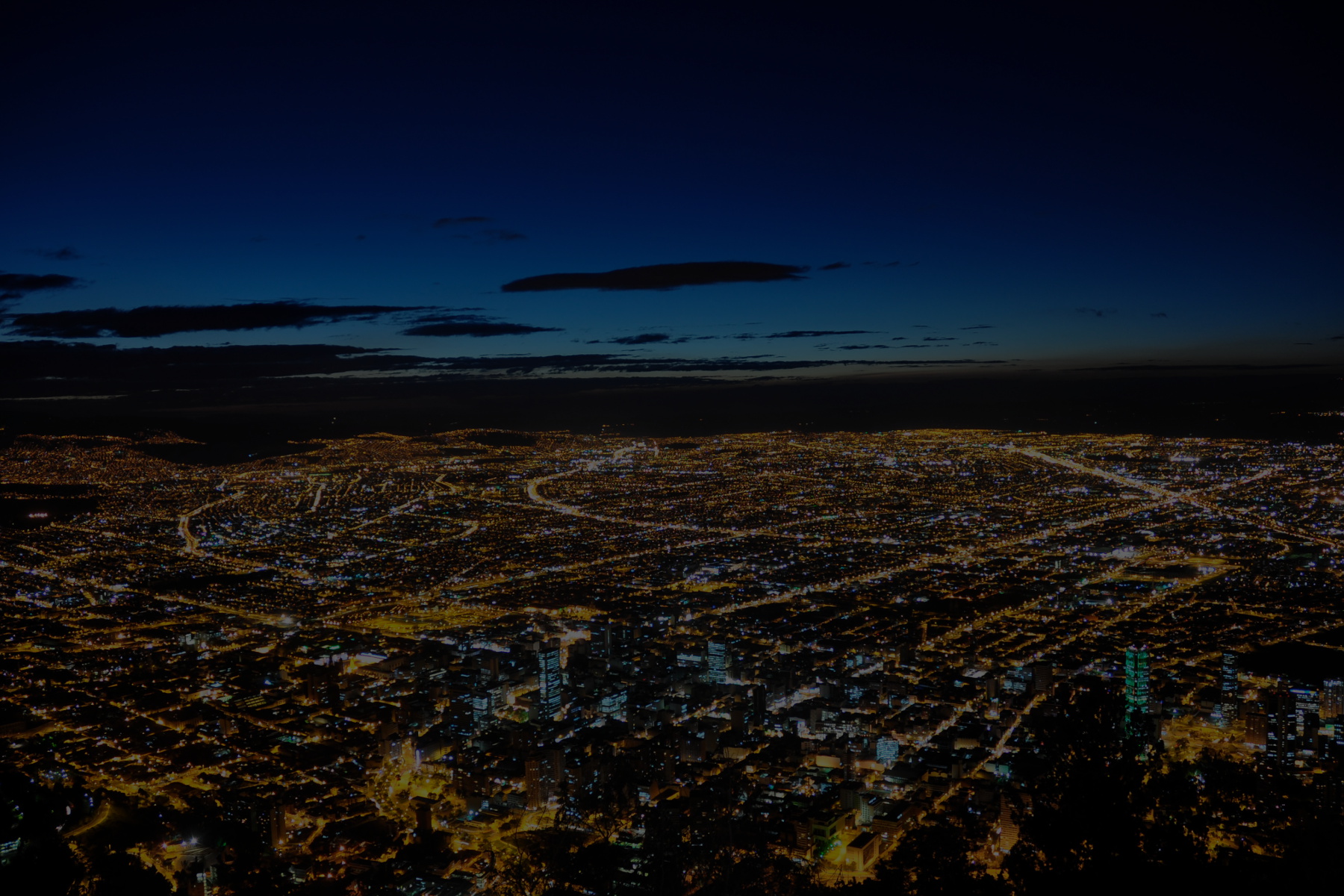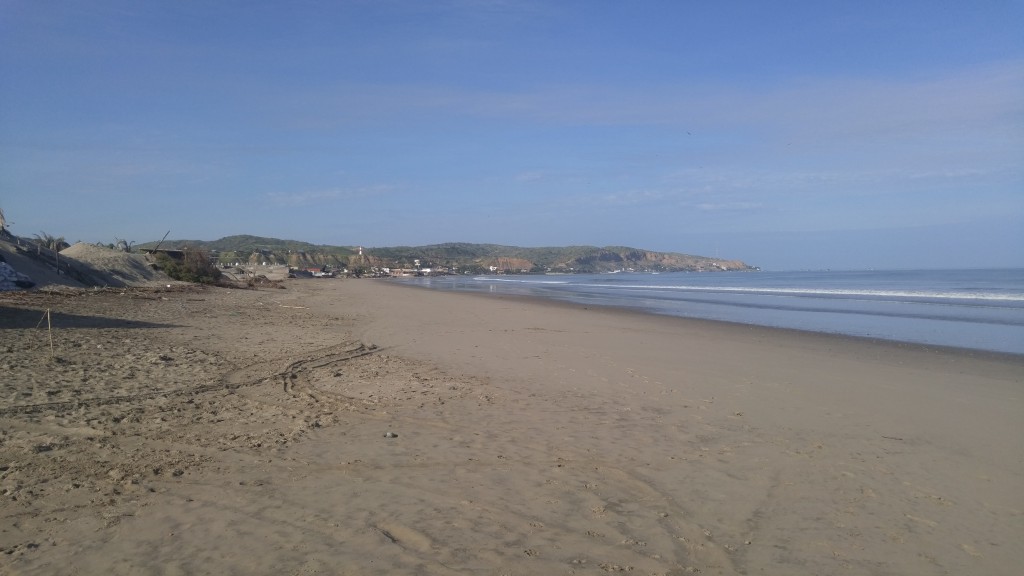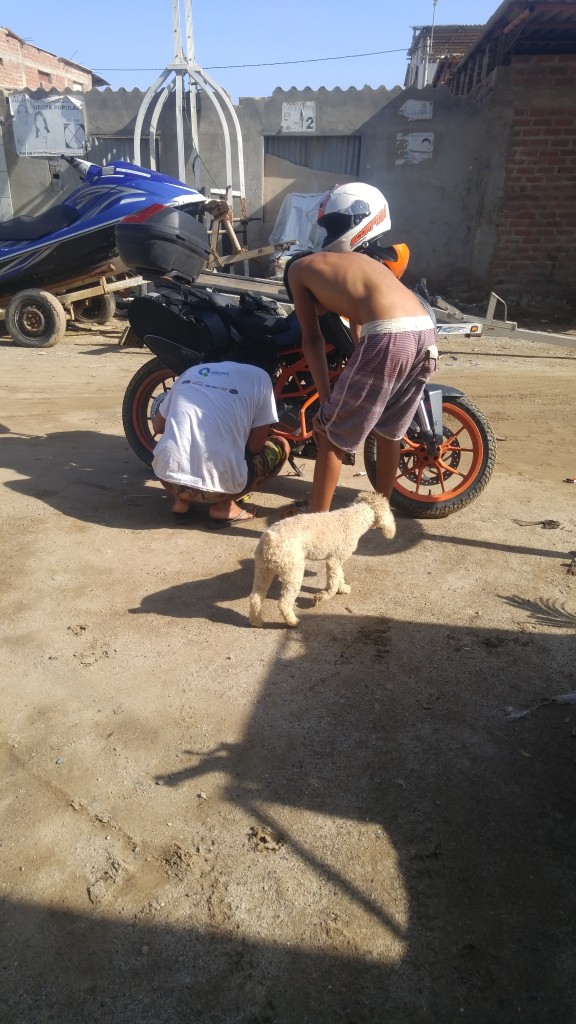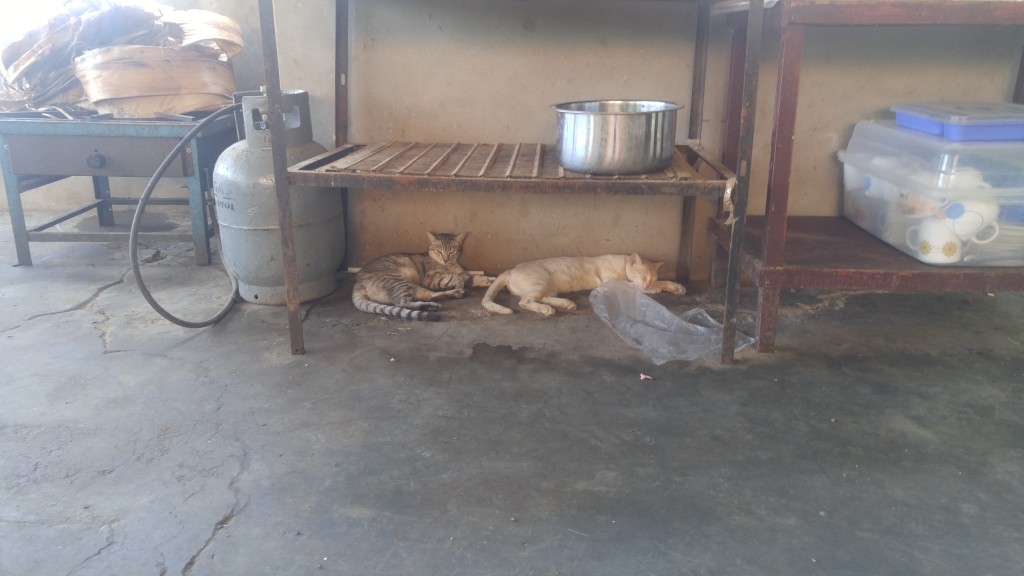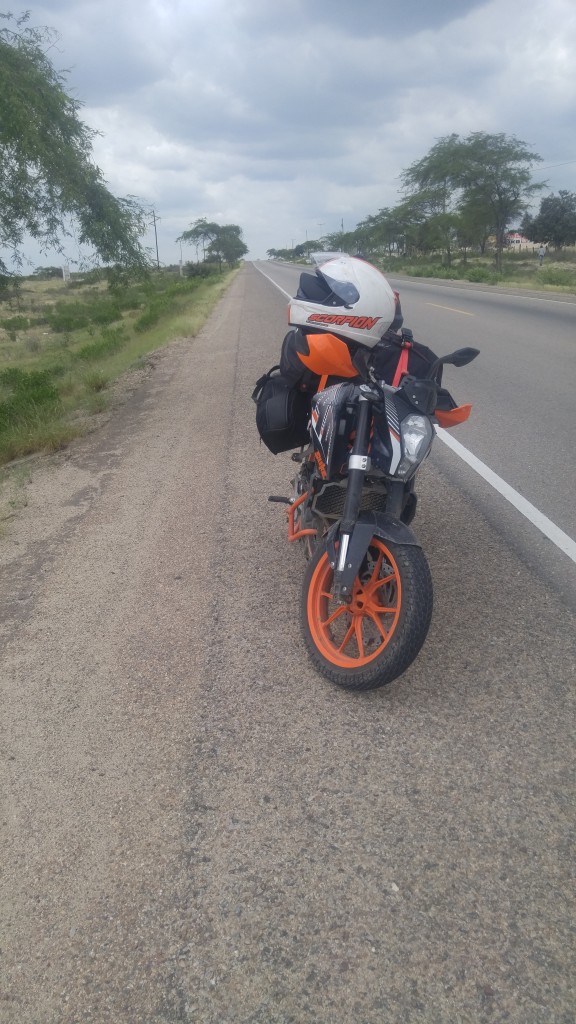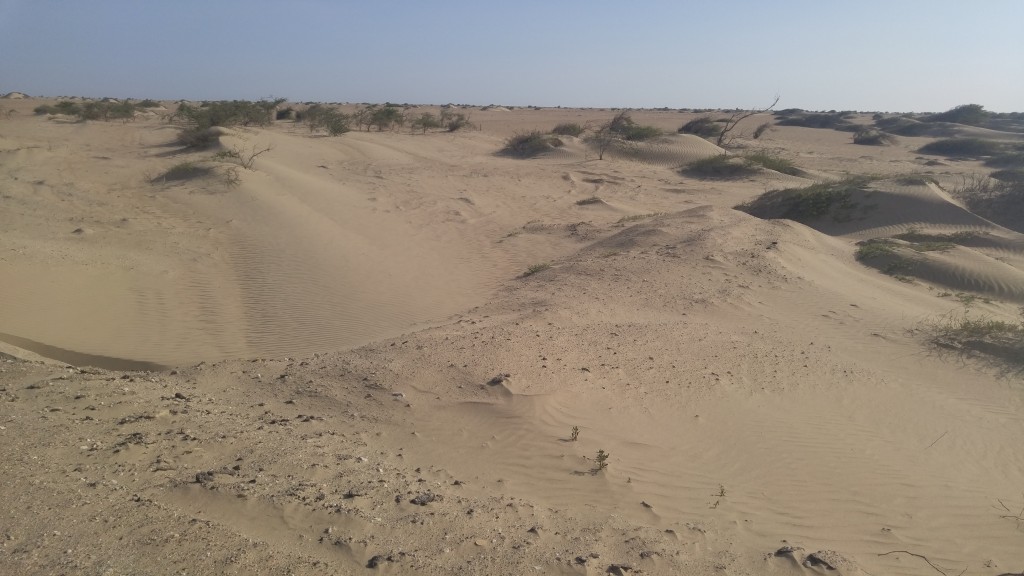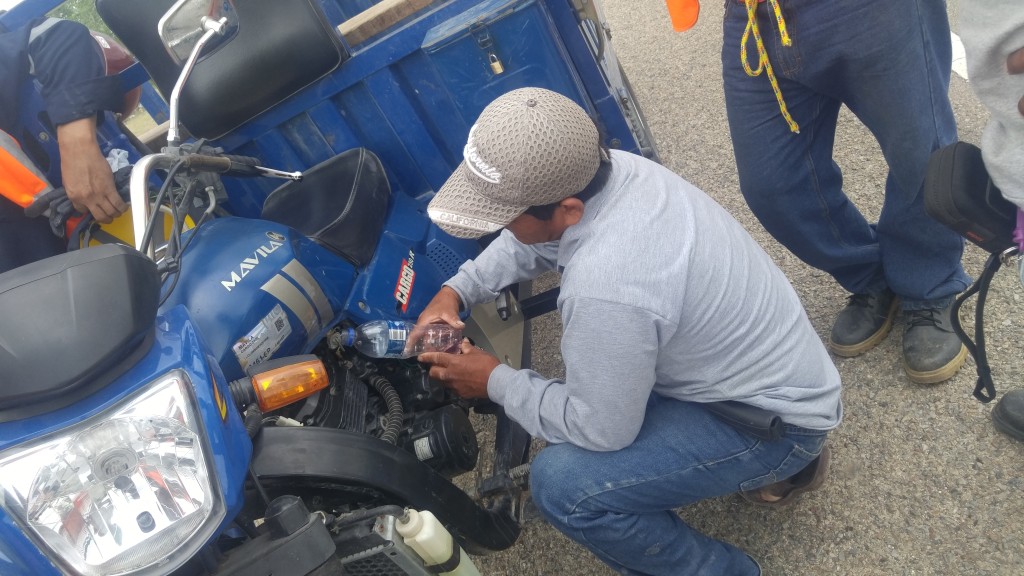When Josh and I were planning this trip, we encountered a lot of questions that couldn’t be solved with an Internet search. For example, Josh pointed out that we would be in pretty remote places; were we sure we would always be able to find gas? It was a pretty good question, and I thought about it for a minute. I told him that our plan was to stick to major roads, and if we were doing that, then there would likely be an abundance of gas stations. Other people would be needing gas, too, so it shouldn’t be an issue. Josh thought about it and agreed with my reasoning, and that was that.
Well, up until Peru.
Mancora Blues
After arriving at our hostel in Mancora, Elizabeth and I crashed for the night in our dorm rooms. When I got into my dorm room, I could hear the Pacific Ocean crashing against the beach nearby. I slept pretty well, and in the morning I decided to take a look at my broken foot peg from the night before. There was absolutely nothing left of it, so it must have fallenn off at the crash site.
I went outside and hailed a mototaxi. I explained that I needed to find something, and didn’t know exactly where it was. The driver looked at me kind of weird, but he agreed to take me. After a few false turns, I found the crash site. I didn’t see my missing foot peg right away, so I dug through some of the sand where I had crashed. After a few minutes, I found it and had the mototaxi take me back to the hostel. It was clear that the foot peg couldn’t be salvaged. It had hit the sand (SAND!) with enough force to completely snap off. I was fortunate to have pulled my foot away from the bike as soon as I realized I had been hit.
In the clear light of day, I could see Mancora a lot better. What I saw was appalling. There was poverty everywhere. The natives were walking around barefoot with very little clothing. The people I could see lived in shacks. The roads were all a mixture of dirt and sand, with huge puddles that covered entire streets. After I returned to the hostel, I found Elizabeth awake and headed toward the beach. I walked with her, and what we saw wasn’t terribly impressive. There was trash strewn all over the beach.
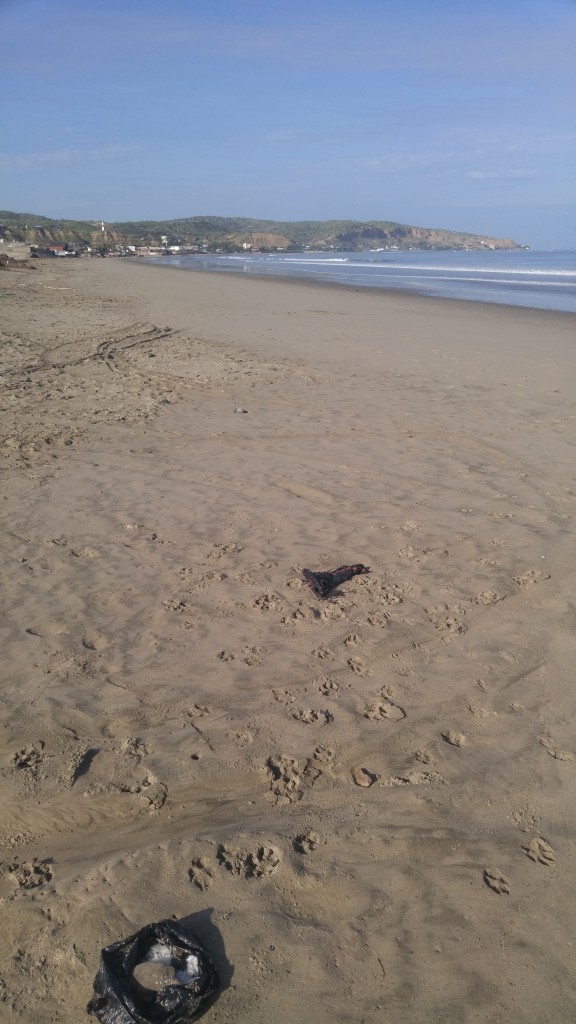
Here, you can see bits of plastic that had been left. There was even more in the opposite direction, but it was too depressing to take a picture of it.
We went back to the hostel, and I told Elizabeth that I needed to see if I could get my foot peg fixed.
I had managed to get the terrible WiFi at the hostel working and had found a motorcycle mechanic nearby. I slowly drove there, doing my best to avoid the huge puddles. Since the sun was out, some of the water had begun to evaporate, but the condition of the road was still really bad. Once I arrived, the mechanic was there, working on another bike. I explained as well as I could what had happened and asked if he could transfer one of my rear passenger foot pegs to the location of the missing foot peg. The mechanic took a look at it, nodded, and got to work.
It took about 15 minutes, but in the end he was able to replace the foot peg. He charged me 5 soles, or $1.66. It was well worth it.
I drove back to the hostel and talked with Elizabeth about the fact that I wanted to leave Mancora. She got a little upset with me. I didn’t quite understand why, so I asked her to explain. Apparently she had left Baños before she was ready because she wanted to help me, since I was sick and couldn’t ride in the rain. Then I was pushing to get to Mancora so we could rest for a few days, and now I had changed my mind and wanted to leave again. She was tired, too, and needed to rest for a few days, which was the original plan.
Seen in that light, I could understand why she wasn’t very happy with me. I had thought about trying to stay for an additional day, but I just had this really bad feeling about Mancora. I didn’t like the place. The beaches were dirty. The roads weren’t maintained. Poverty was everywhere. I didn’t like the hostel we were at; it was a party hostel without private rooms. The lockers they provided weren’t big enough for my bags…I had to take out the valuable items and store them separately. On top of that, the WiFi connections they offered did not work well from the rooms. When I take time to rest, I generally get online. Being without Internet in a town that didn’t have much to offer wasn’t very appealing.
We talked a little while longer but it was clear that neither of us were going to change our minds. I told her that there was a town called Chiclayo only five hours away, and that I’d like to go there. She eventually said that she was going to stay in Mancora, but if I wanted to go off on my own she was fine with that. I didn’t like that we were splitting up, but I disliked the idea of staying in Mancora even more. I went back to my room to pack and book a hotel online. About an hour later I was ready to hit the road.
On the Road Again
I was terrified of getting stuck or falling in one of the huge puddles on the way out of town, so I paid a mototaxi driver a few soles to lead me to the main road. He couldn’t quite understand what I was asking him at first, but eventually he understood and took the lead. After a nerve-wracking ten minutes, I was back on the Pan-American highway.
After about two hours, I was ready for a break. I pulled over in some random town (literally. I just pulled up the location on Google Maps and can’t find a name for the town) at a convenience store and bought some bottled water and lime cookies.
I spied some cats sleeping under a nearby grill and took a picture.
Thirst quenched, I reapplied my sunscreen and hopped on my bike, riding through the towns of Sullana and Piura. At some point before I got to Piura, I started to get concerned about my fuel level. I kept an eye out for gas stations as I drove through, but every gas station was supercrowded and had tons of loose sand and gravel around it. I was concerned about falling over, so I kept looking. My low fuel light came on at some point.
By the time I left Piura, I had been driving for 10km with the low fuel light on, and it said i had 23km left. I had no idea how far I could go before I ran out of fuel, since I had never run out before. When I looked down at my instrument panel a few minutes later, the “gas remaining” had changed to say “0 km left” and my gas gauge was completely empty.
I pulled over at a roadside stand and asked where the nearest gas station was. The guy shrugged and said they were about equally far. I decided to keep going in the direction my GPS was saying I needed to go. I drove and drove for quite a while…staying in 5th gear and trying to keep my speed constant in order to minimize how hard the engine had to work to keep me going.
But then, 48km after my fuel light came on, the bike ran out of gas. I then understood why all the gas stations in Piura had been crowded.
The first thing I did was check my supplies situation. I always carry water in my saddlebags in case I get stranded somewhere without safe water to drink. I looked at my phone to see if I had service. I had a cell connection, but no 4G data. Since I had just arrived in Peru the day before, I hadn’t had time to purchase a local SIM card and a prepaid data plan. However with the cell connection I could send a text message.
My emergency contact is my friend Caleb. If anything strange happens, I’m supposed to let him know so he can call the local police, the US Embassy, or my family…whatever is most appropriate. I texted Caleb to let him know I was stranded without gas. He asked for my geographical coordinates, and it took me a little time to figure out how to find those on Google Maps on my phone. I sent the coordinates and said I’d let him know when things changed.
I saw a construction worker nearby, so I walked over to him and asked for some help. He didn’t speak English and I didn’t speak very good Spanish. I communicated that I was out of gas, and that I needed to know where the nearest gas station was. He was part of a larger group of construction workers, and he waved them over. They all crossed the road to look at my bike, and I asked them what I could do to get gas. They said there was a gas station in the direction I was going, so I asked them if it was safe for me to leave my bike and walk to the gas station. They all shook their heads and said no, it was dangerous.
So I was stuck at my bike until I could find gas. In the desert.
They flagged down a passing policeman, also riding a motorcycle and transporting someone somewhere. The construction workers explained my situation and the cop said he would be back in about 30 minutes; he had to take care of something first.
A few minutes later, a mototaxi drove by. The construction workers flagged him down and asked if he could spare any gas. To my surprise, he said yes and asked if I had a bottle. I had drunk an entire bottle of water while all of this had been going on, so I had an empty bottle for him to use. The mototaxi driver disconnected the fuel line on his taxi and fuel began to stream out.
He handed me the full bottle of gasoline, and I put it into my motorcycle. He charged me 10 soles ($3), and I was happy to pay it. I started my bike and it roared to life. I drove, cognizant that my problem hadn’t been completely solved. I still needed a gas station. One kilometer later, I found a gas station and filled up. I texted Caleb to let him know I had found gas, and hit the road again.
I swore I’d never get into that situation again.
That oath lasted all of two hours.
Out of Gas: The Sequel
This time I started looking for gas when my fuel tank was at the halfway mark. I didn’t see anything. No roadside stands, no professional gas stations, no sketchy gas stations. Nothing at all. My anxiety steadily increased as my fuel ran out. It spiked a bit when the low fuel light came on. I tried not to panic because A) panicking doesn’t help and B) I knew from earlier in the day that I had around 48 km until I ran out of gas, which is about 29 miles. It seemed like plenty of time to find something.
Spoiler: It wasn’t.
After I had gone 6km with the low fuel light on, I pulled over when I saw some people and asked if they knew where a gas station was. They pointed in the direction I was going and said it was 40km away. That worried me; 40 km would really be cutting it close. I asked if they had some gas there that I could use, and they said no. I hopped on my bike and rode in the direction of the gas.
I don’t remember what the odometer was on when I finally ran out, but run out I did. There were moto-taxis and I tried to flag them down but none of them would stop.
After about 15 minutes I walked to a nearby clearing where there were some people loading up an old truck. I asked if they had gas, and they said no…but they would be glad to put my bike in their truck when they were done and take me to a gas station. They figured it would be another half hour. I thanked them and walked back to my bike. I texted Caleb again to let him know of my predicament.
Shortly after walking back to my bike, I saw the man I had spoken with walking in my direction with a two-liter bottle full of gas. I confirmed that it was gasoline and not diesel and put it in the bike. He charged me 14 soles, and I once again gladly paid it. I got back on my bike and found a gas station 3km away. I stopped and filled up. Since I had paid for gas on the side of the road twice, I actually wound up being short by about 5 soles. Fortunately, the attendant was willing to just eat the cost. Otherwise I would have had to find an ATM.
I got back on my bike and after another hour I was in Chiclayo for a well-deserved rest.
